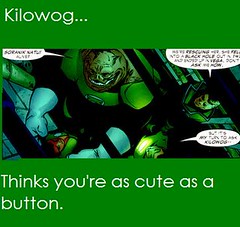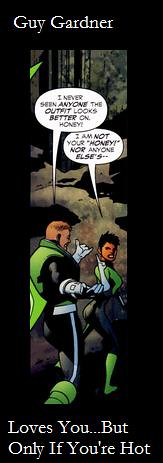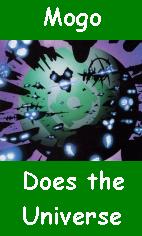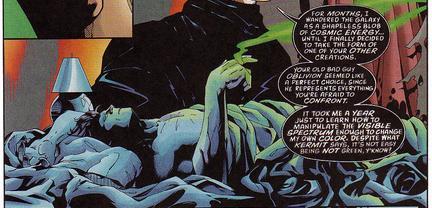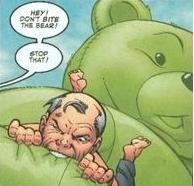I have a really unpopular opinion coming up, I think. One that might shock a lot of people. It's about Marvel. For once. About the great and wise, Professor X.
I hate him.
That's right, you heard me. I absolutely despise Professor Charles Xavier. I think he's an idiot, and quite honestly, fairly monstrous. Your mileage may vary of course.
Let's start with why I think he's an idiot. That's the hardest to justify I'd imagine, as he's Charles Xavier. I don't doubt he's a brilliant man, and very powerful, but when it comes to PR, he's a complete buffoon.
See, okay, I get that mutancy's like a metaphor for race, for sexual orientation, et cetera. (It's a very visible isolating quality often, like race, and can occur for seemingly anyone, no matter their parentage, like sexual orientation.) I get that Xavier preaches a message of tolerance and brotherly togetherness like Martin Luther King Jr.
So how does he go about it? Peaceful protests? Public appearances to show that mutants really aren't any different?
Nope, he raises a *private* *army*. One that the average populace only sees in huge battles (usually against other private mutant armies) that cause immense property damage, and occasionally even hurts bystanders. Yeah, that's gonna help your cause, isn't it, Professor X? Certainly would put *my* mind at ease.
And see, the fact that the Fantastic Four exist in the same universe simply underscores Professor X's idiocy. Let's look at the Fantastic Four. Okay, they were born normal, but the cosmic ray's alterations fit the dictionary definition of genetic mutancy. And there are folks on the X-Teams that's powers came from external sources. And even aliens.
The Fantastic Four have no secret identities, their headquarters is the unmistakable, famous Baxter Building. Reed Richards creates space-worthy craft, and extremely dangerous weaponry, and dimensional gateways and crap all the time. And no one minds. While presenting to the UN, he'll stretch across the room to grab a pencil, Sue and Johnny use their powers publically, and Ben can't turn his off.
And the people love them. And not just because it's a different book with different teams. It's because they're well known, because they're human (figuratively) faces. The X-Men are scary troops of uniformed alien-seeming mutants. But the Human Torch? That's just Johnny Storm! He's a hot rod who flirts with most of the women in New York. The Thing, that's Ben Grimm, he's a little scary looking but he plays a mean game of pool.
See what I mean?
I think we all remember being kids, and being afraid of strange-looking people, like maybe the old woman down the street with all the cats or the guy with the artificial arm...things like that. When you're little, you're ignorant, and these folks seem scary. The lady's a witch! The guy's part robot! But then you get to know them, and the witch lady's actually a really nice widow who's got pictures of her grandkids on the wall and will let you play with the kitties, and the guy might have lost his arm in an accident, but he's pretty much just like your dad. 'xcept for only one arm, of course.
It's basic psychology really. And a guy like Xavier should *know* that. Reed does. There's a nice scene in one of the Waid issues, where Reed hires a publicist and no one understands why. But he confides in little Valeria how, because he robbed his loved ones of their normal lives, he was very emphatic about encouraging their public personae, the code names, because by making them celebrities, he was protecting them from fear and revulsion. And that's why Reed Richards is the smartest man in the Marvel Universe.
Hell, even look at the movies. Look at X-Men's destruction of the train station, and Fantastic Four's bridge mishap. I've heard people complain that the Fantastic Four shouldn't have become media darlings for solving a mess they caused. But the reason they got that attention is because by solving the problem, and sticking around afterwards, and showing themselves to be pretty normal folks, well then, that makes them pretty nifty. Normal folks that can do cool things and are willing to help out. They've even got real names. Neat! Now the X-Men stuff, to be fair, they're too busy saving Rogue to help clean up the station wreckage. But think about what those people must think. A mutant battle, one's power goes crazy, destroys everything, and they're gone. No wonder mutants have become boogeymen.
Another reason I hate Xavier is that he's manipulative and controlling, I think. It might just be that I was for a long time really into Silver Age Marvel, but Xavier there is scary. He micromanaged all of them, lusted after Jean and expressed both resentment and support for Scott dating her because *he* couldn't. And there's at least one case that I can recall, where Scott is reluctant to obey, and we see Xavier raise his hand. Then Scott backs down. Now if I had my copy of the book with me I'd scan to share. But I don't. But I know personally, I never knew quite what to make of that panel. Either he was a) using mental coersion or b) physically threatening his foster son (who has a history of abuse).
Now that might just be back then, but as far as I know, it hasn't been retconned out, and he's done a great deal of manipulative crap since. And Onslaught was all his fault.
My hatred of him is also personal. Let's look at Cyclops. I know Scott's not a very popular character, he's uptight, brooding, and almost fanatic. (Though one shouldn't forget his very dry, amusing sense of humor. But I digress). But all those, undeniable, traits, were either caused or exacerbated by Xavier.
Think about what we know of Scott's backstory: parents in an airplane, sole parachute strapped to both kids, it doesn't open, Scott's powers activate saving their lives, but he gets brain damage and is comatose/amnesiac. Nathaniel Essex, Mr. Sinister himself arranges for the kid to be placed in his scary orphanage, until the kid escapes. Ends up with powers activating, and is taken in by the thief Jack of Diamonds.
Okay, even providing that Xavier doesn't know about anything preceding Jack (which I doubt...most powerful telepath after all), he knows he's got this abused, terrified, abandoned and isolated 15 year old, that really has no where else to go and no one else to rely on. (And I want to know who thought giving a child to Xavier to begin with is a good idea...I'm thinking there was mind whammying involved).
So what does Xavier do with this poor thing? Get him counseling/therapy, support him so he can have something resembling a normal life? Nope. He makes him his prize soldier. He is the sole support structure for a damaged, abused child, and uses that to indoctrinate him so firmly into the "dream" that it amounts to brainwashing.
As for Scott, of course he's fucked up. He's finally, for the first time in *ten years* some place where he can stop running, stop looking over his shoulder, stop worrying about scary things in the basement or being hurt when he disobeys, and he's being primed to be Xavier's second in his private army.
And honestly, I can't see that as anything but *monstrous*.
I complain occasionally about the treatment of sidekicks in the DCU, how Batman's screwed up his Robins...Dick's a basket case, that whole mess with Tim's "present"...but you know, Batman never intended to have Dick as his sidekick at all. Not at first, that was a choice that Dick made. And Dick had a social life, had Alfred, had school had the Titans, had Clark, even. Tim's got his own network, his family, his contacts...
Batman's not completely sane, and the horrible "present" thing in particular, well, that was actually meant to benefit Tim...sort of. It definitely means that, now that Tim can't trust anyone on blind faith anymore, he will never have a Harvey Dent...but Batman in general really does care about his sidekicks. He can't express it, but he does. And any screwing up is largely due to his own fucked-up-ness, preventing normal relationships.
With Xavier, it's worse, because I get the impression that Xavier meant to do this. That he *deliberately* made a vulnerable, dependent child into a weapon. I also don't get the sense that Xavier cares nearly as much for Scott as Bruce does any of his sidekicks. So you have an emotionally neglected, physically abused child with nowhere to go, no one else to turn to, with a power that's impossible to hide or control, probably scared and alone and seeking reassurance. With his history, the kid probably figured out real quick that anything good came with a price. He might have even believed that becoming Xavier's pet soldier was a *condition* on staying in this nice, safe, warm haven. If he said no, would he be kicked out?
I'm not saying that's what Xavier expressed or intended, but this is the kid who upon being given quartz glasses to be able to not kill/destroy stuff when he opens his eyes, was then made to help rob banks. There's no way that child wouldn't think of that and honestly, I doubt Xavier ever bothered to clear that misconception up.
So yeah, given that, is it any wonder that Cyclops grew up so uptight, screwed up, brooding and all those other things that Cyclops-haters hate about him? And he's *still* using vulnerable children to fight his private wars. Fortunately now there are other mutants: Jean (well, pre-deaths), Storm, Logan, even Scott to mitigate that effect.
But Xavier...is a bastard. So I hate him. :-)
